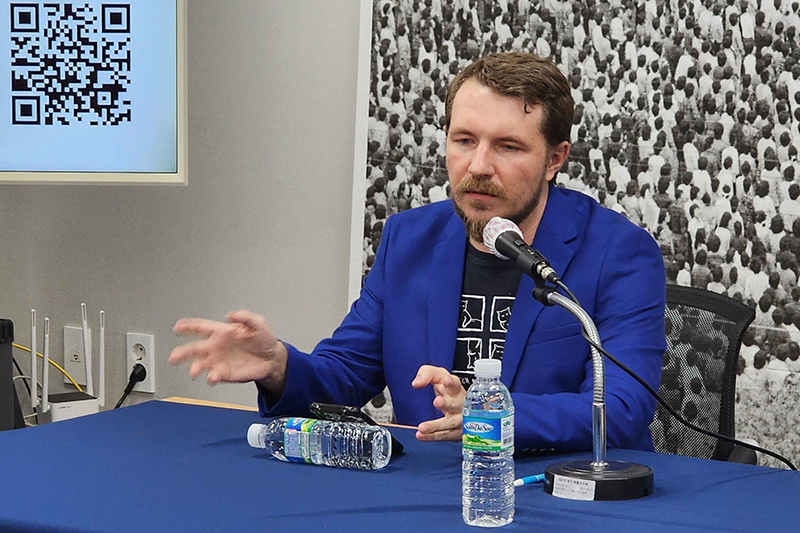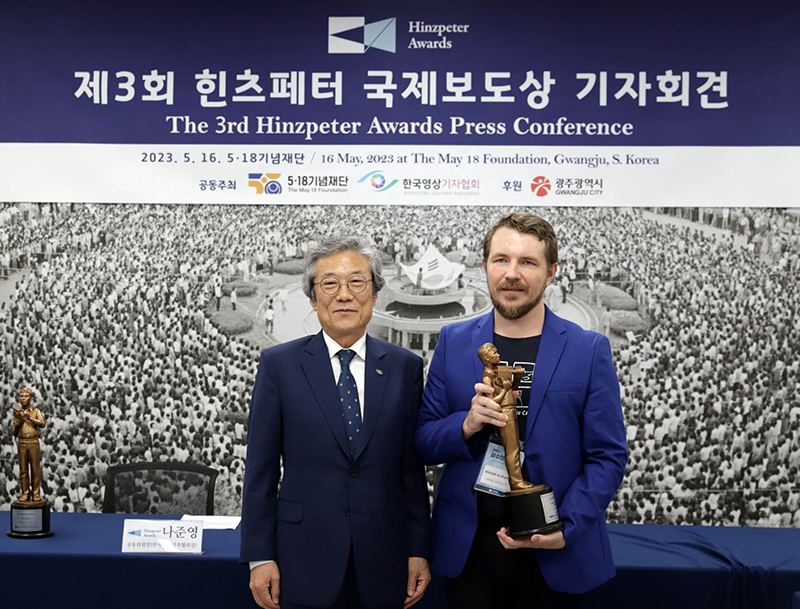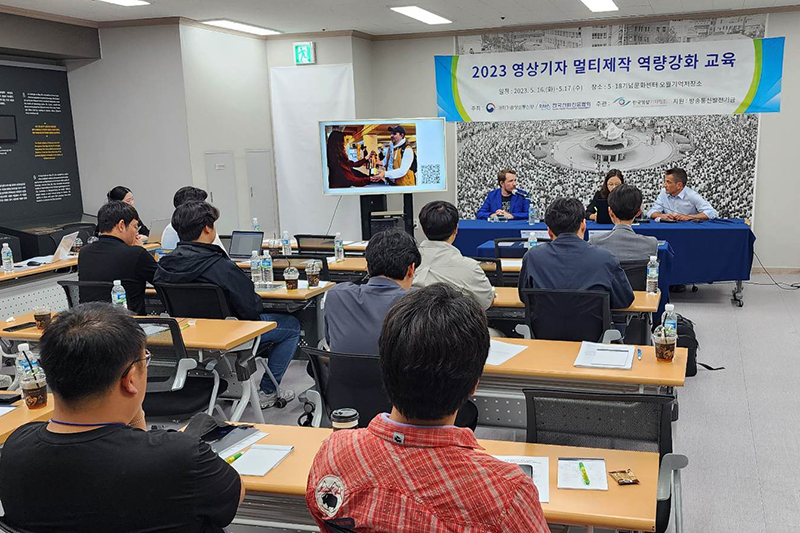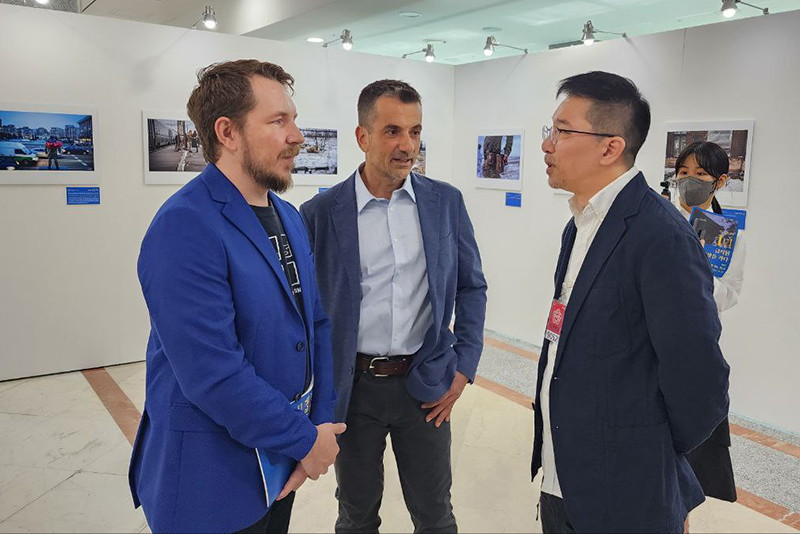«For them, the events in our region are a conflict between Russia and satellite countries.» Belarusian journalist talks about visiting South Korea
Two years ago, journalist and documentarian Mikhail Arshynski received an award for a film about the 2020 political campaign at the Hinzpeter Awards Documentary Film Festival in South Korea. And now he has been invited back to the country that until recently was a brutal autocracy and very much resembled modern Belarus. Our colleague shared with BAJ his impressions of Asian democracy, his vision of the situation in our region, and the role of the media.

«I have never seen such a thing in Belarus»
Mikhail Arshynski is a journalist from Mahileu. Almost from the very beginning of the foundation of Belsat, he worked at that TV channel. As he says, it was there where he learned the reporter’s craft doing news and interviews. For two years he worked as a special correspondent in Moscow.
His first major documentary work was a film about a 25-year-old Belarusian Mikhail Zhyzneuski, who died during the Euromaidan in Ukraine.
«When the political campaign of 2020 began, I immediately realized where everything was heading,» says the reporter. «I was interested in the personality of Siarhei Tsikhanouski, who wasn’t taken seriously by the media at first. He was an ordinary blogger who spoke the language of the common people and trolled officials. However, behind the external image, I saw a new type of politician who attracted attention and could compete with Lukashenka.”
The journalist started following the blogger, filming his meetings with people, conversations with government officials. It was a big investment in the future project.
«At first I thought it would be a film about the movement around Tsikhanouski,» the interlocutor of the BAJ notes. «Then his team began to form, and ordinary people joined it. It was important for me to show a unique phenomenon: caring citizens were getting involved in political events in order to change reality. First of all, I was interested in this social phenomenon. I have never seen such a thing in Belarus.»
The heroes of the film Don’t be afraid are medical professional Volha Paulava, engineer Aleh Maiseyeu, housekeeper Antanina Kanavalava, who collected signatures, participated in the election campaign, and sought to do the best for the country.
The uniqueness of the film is that each stage of the Tsikhanouski campaign (first Siarhei’s, and then Sviatlana’s) was recorded by Mikhail Arshynski, who from the very beginning managed to see the potential for his project.
BAJ calls on colleagues around the world to support the solidarity action! You can print portraits of your imprisoned colleagues, take pictures with them at famous sights of your city (not in Belarus) and post them on social media with the tags #СвабодуЖурналістам and #BecauseTheJournalist, and also send them to us baj@baj.by.
«The budget was very modest. I used two simple cameras for filming. However, the process of collecting the material took a lot of time, about ten months,» the journalist says. «As a result, it was possible to record how the wave of popular indignation rose against the dictatorship.»

From the very beginning of the election campaign, the journalist was under a threat of detention. He even had to serve several days of administrative arrest.
«After the election, I received a signal that I was being looked for,» the author of the film continues. «At that time, I was in a difficult psychological state after the detention of colleagues, friends, and the heroes of the film. I was especially shocked by the arrest of a very close friend Daria Chultsova. I realized that I would not be able to work on the film in Belarus anymore, and I immediately left.»
What festival and what Jürgen Hinzpeter?
The journalist managed to take the video archive abroad and has already safely produced the film. It was released in 2021.
«I wanted the film to be simple, clear, and dynamic, so that an ordinary person could understand our history,» emphasizes Mikhail Arshynski. «First of all, I focused on the Belarusian audience, but the film was also received well by foreigners.»
At some point, he was offered to apply to the Hinzpeter Awards Documentary Film Festival, which takes place in South Korea.
«Until then, I had never applied for such awards», says the interlocutor of BAJ. «This was the first attempt. I thought: why not? I did the paperwork and quickly forgot about it. And after a while, a letter of congratulations came.”

It should be noted that the festival is important for the modern history of South Korea. It is named after a German journalist Jürgen Hinzpeter, who reported the events in the city of Gwangju in 1980.
That year there was an uprising against the dictatorship that had been reigning for the previous decades. It was brutally suppressed, and several hundred people fell victims. However, these events are considered the starting point for the democracy. Although the city was cordoned off by the military, Jürgen Hinzpeter managed to get the video materials out, and thus the whole world learned about the crimes of the political leadership of South Korea at that time.
Of course, the changes did not happen immediately, but the first step was the uprising in Gwangju, and the role of the German reporter in letting the truth be known cannot be exaggerated.
Giving the victory to Mikhail Arshynski’s film, the festival jury appreciated the dedication of the Belarusian journalist.
By historical standards, quite recently it was an authoritarian state
Now South Korea is known as a democratic and technological country, which produces modern cars, smartphones, and robots. However, by historical standards, quite recently it was an authoritarian state where human rights were systematically violated.
After the Gwangju uprising, the authoritarian regime lasted another eight years. How did the changes happen? Some are talking about the inevitable inertia of those events, some are talking about the influence of international pressure.
«During my stay in this Asian country, it was clearly felt that only the people themselves can and should decide their fate,» emphasizes Mikhail Arshynski. «Before I went to Korea, I thought that the United States played a significant role in the success of the country. But this is not so — people themselves have achieved prosperity. And no one but them.»

Despite the wars, occupation, and collapse of the country that South Korea has faced over the past century, the state has not been destroyed and the will of the people has not been broken.
«It is impossible not to notice a lot in common between our countries,» the journalist draws a parallel. «Both Belarus and South Korea are located between empires, and therefore they regularly faced existential threats. This gave me an understanding: whatever happens in Belarus in the near future, it will only give us an opportunity to make our move and ensure our independence.»
«The rise of nationalists» and «it’s not our business to interfere there»
It seems that South Koreans, having such experience, must have supported democratic changes in Belarus in 2020. At the very least showed solidarity.
«But it’s not that simple,» sighs Mikhail Arshynski. «The Belarusian revolution did not lead to loud declarations. The protests were received in silence. Moreover, Seoul continues to cooperate with the regime.
According to the journalist, it is related to the peculiar vision of our region which South Koreans have. It seems that many politicians, influencers, and intellectuals perceive the events in Ukraine and Belarus as a conflict between Russia and its satellite countries.
«Even among educated people, one can hear narratives of Russian propaganda,» says the journalist with a surprise. «During the democratic forum where I participated, one of the speakers promoted the statement that this is «the rise of nationalists» and «it is not our business to interfere there».
Of course, the Belarusian explained that the events in Belarus and Ukraine have the same roots, and this is due to Russia’s neocolonial policy towards its neighbors. That this is an attempt to seize, subjugate, establish control in the «ancestral territories».

He also spoke about the terrible human rights situation in Belarus and the fate of imprisoned journalists, including Katsiaryna Andreyeva (Bakhvalava). Due to the fact that the visit was organized at a high level, this information was conveyed to politicians, journalists, and decision-makers.
«Freedom of speech must be constantly defended»
In the Index of Freedom of Speech-2023, South Korea ranks 47th. For comparison: Belarus is on the 157th position.
«But one cannot be completely satisfied with the situation of journalists and media,» believes Mikhail Arshynski. «Freedom of speech must be constantly defended, and it is so in South Korea as well. The country has a high level of corruption and strong political competition, which affects journalism.”
In particular, there were persistent attempts by politicians to influence the media more, but this instantly caused a wave of indignation.

The media can be divided into two groups: liberal and conservative. Both have influence, support different political parties, and cover events in different ways.
«It is much more important that state institutions are not closed to the press, and politicians are available for journalists. This is an indicator of the role of the media in society,» the BAJ interlocutor notes.
During his visit to Seoul, the Belarusian was invited to a photo exhibition held in the parliament. It was dedicated to the victims of the war in Ukraine. It is symptomatic that it was arranged by the representatives of the media who better understand the processes in Eastern Europe.

Photographs, like other documentaries, record events for many years, to which the best evidence is the work of Jürgen Hinzpeter.
«This allows you to explore the situation deeper, and not to make a superficial story,» believes Mikhail Arshynski. «If we talk about documentaries, then over time they become even more relevant, as they tell about historical changes in society.»
The journalist does not rule out that he will make a continuation of the film if the events in Belarus acquire a new dynamic. At the same time, he has a great desire to continue reporting in documentaries and on other topics.
Read more:
“I stay so that those who have been imprisoned or forced to leave have a place to return to”. Motivations of journalists who choose to stay in Belarus
Poland Puts Sanctions On 365 Belarusians Over Journalist’s Jailing
«We stand by the truth, we stand together!» A marathon of solidarity with the imprisoned journalists started in Vilnius
 @bajmedia
@bajmedia
